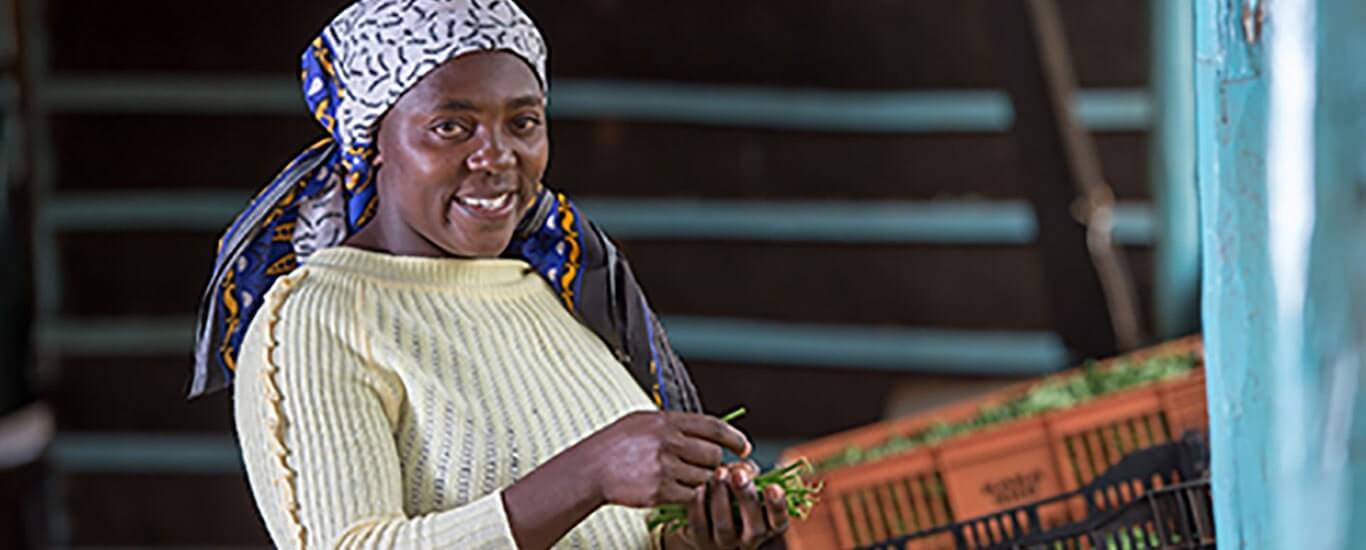Kenya’s horticultural farmers are being trained in good agricultural practices.
History has shown us the social and economic transformation that is possible when people can grow enough food. It has also confirmed that when the same people access markets to sell excess produce, generations will feel and enjoy the impacts. Thus, the ability to improve livelihoods is what makes agriculture a business and not just a development initiative.
A group of Kenyan farmers are now demonstrating this by financially supporting their local community health centre. Farmers from Kangai Horticulture Marketing Co-operative Society in Kirinyaga County, in the central region of Kenya, built a maternity wing and a laboratory in their local health centre with proceeds from the sale of string beans and baby corn. The enterprising group struck a deal with exporters, that for every kilo of produce sold, a shilling is invested in the hospital project. Currently, the health centre attends to 150 to 200 patients daily.
“We receive services we couldn’t receive before, such as TB (tuberculosis) and CCC (Comprehensive Care Centre) for HIV and AIDS patients,” explains Mary Wambui, a technical adviser with a local fresh producer organisation, adding that the number of staff in the health centre has grown from 4 to 22.
The hospital extension is Peter Kanyuiro Ngigi’s proud legacy, together with his Fresh Producers Association of Kenya (FPEAK) certificate. This certificate, he explains, has been the key to his ability to access international markets, a market that has in many occasions locked out Kenya’s produce because of quality issues.
The FPEAK certificate bears the date December 2012 – significant in that it coincided with the European Union’s (EU) notice of new restrictions on vegetable imports from Kenya, after they were found to contain a prohibited chemical. The ban came into force 1 January 2013.
Kangai Horticulture Marketing Co-operative Society, of which Peter Kanyuiro Ngigi is the chairman, has up to 150 active members. He explains that, prior to 2010, the EU used to absorb 80 percent of Kenya’s exports before market regulations forced restrictions – which is why FPEAK began training farmers to meet the new EU regulations.
Training in good agricultural practices
TradeMark Africa partner FPEAK fills the information and awareness gap in Kenya’s agricultural sector and designs and undertakes training for farmers. Since 2011 TMA has funded FPEAK to train farmers in ‘good agricultural practices’ (GAP). GAP is a market standard that requires farmers to observe certain market requirements on food safety, food quality, sustainable farming practices and reduced environmental impact. The market (in this case the EU) sets the standards based on customers’ demand for safe products.
FPEAK training builds farmers pest management skills and trains them in food safety principles, traceability and occupational health and safety. To manage their businesses, the farmers learn everything from environmental conservation and soil, pollution and waste management, to record-keeping and internal audits. FPEAK offers courses for beginners, second-level trainees and for auditors of farmers’ practices.
Farmers attend FPEAK’s training courses in large numbers, knowing that the knowledge gained held the key to a secure financial future. So far, 20,000 farmers have taken the three-day courses. An easy to understand GAP manual gives farmers a reference point after training.
Mary is a farmer and a former FPEAK technical assistant. “We were trained to teach farmers on the correct use of chemicals, harvesting periods and packaging to minimise post-harvest losses,” she explains, adding that personal hygiene and environmental sanitation are crucial. “For example,” she continues to share learnings, “graders should have clean hands, clean clothing, and adequate protective gear including hair covering. Nails should be short with no varnish and metallic jewelry avoided.”
FPEAK’s mandate is to restore farmers’ confidence in horticulture, and this has meant taking tough measures, including finding the farmers who are not complying with regulations. Farmers are counting on FPEAK to help them overcome the remaining hurdles, especially as they try for certification that will enable them to benefit from the global (as well as the EU) market.
For Peter Kanyuiro Ngigi, meeting GAP standards and accessing good markets for his produce is essential for his family’s future. “Proceeds from my farm,” he explains, “pays for my family’s National Health Insurance Fund. My children have attended good schools, and the firstborn is now a third year student at Maseno University.” All of which proves yet again history’s message that access to markets can make a lasting difference to people’s lives.















